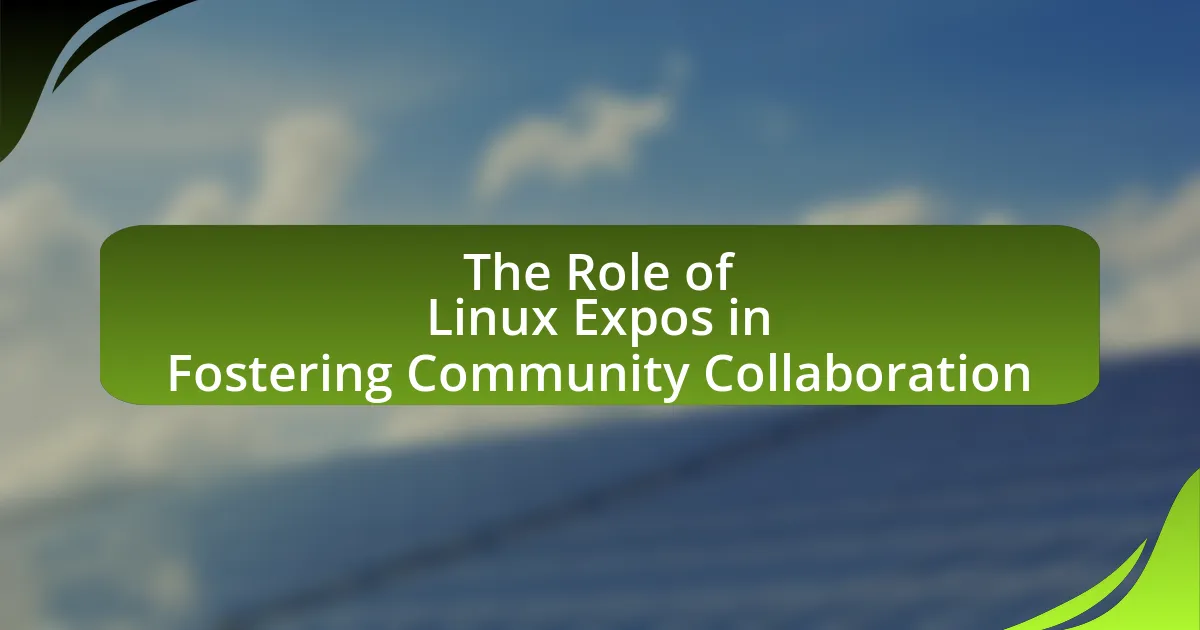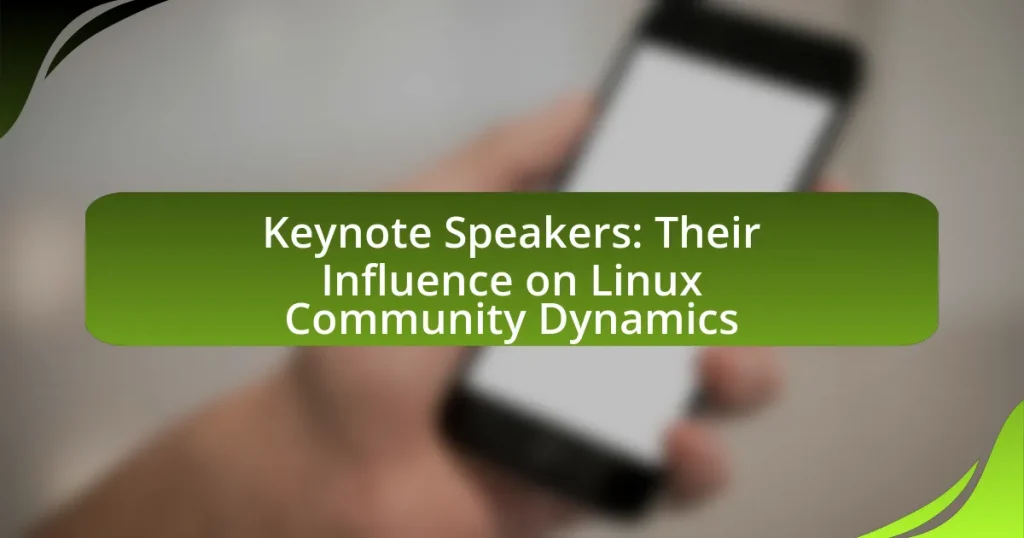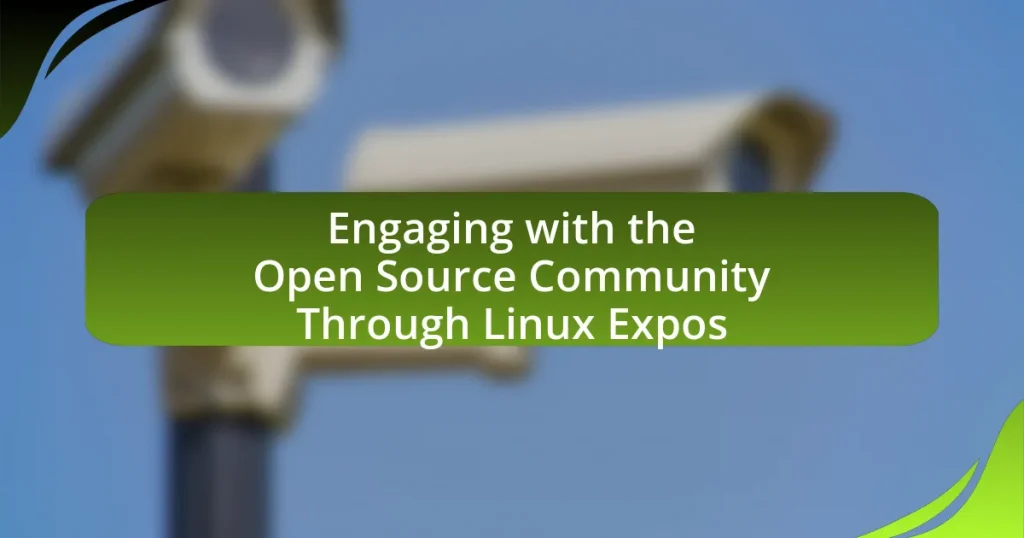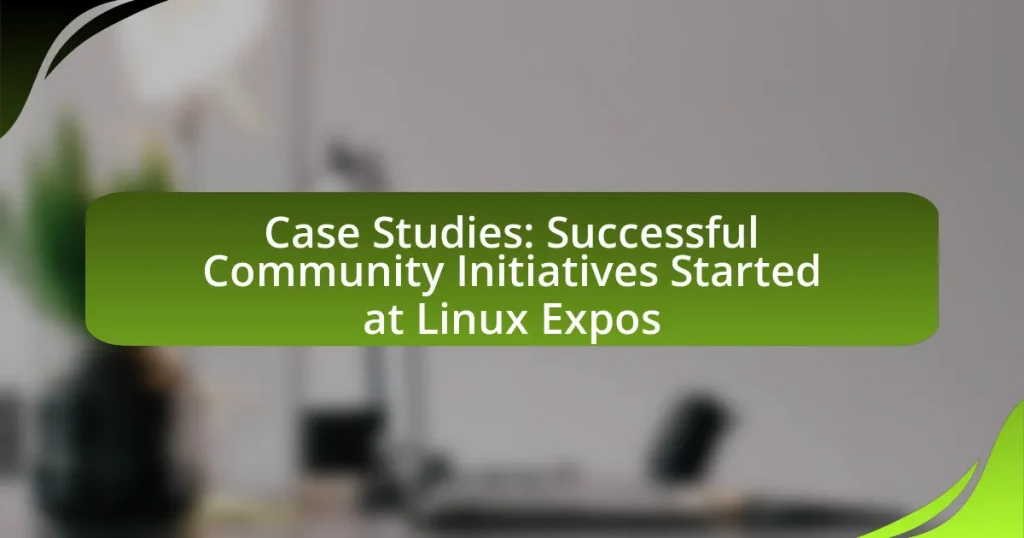Linux Expos are significant events that promote collaboration within the Linux community by showcasing technologies, projects, and initiatives. These expos facilitate networking, knowledge sharing, and partnerships among developers, users, and educators, enhancing the open-source ecosystem. Key interactions at these events include workshops, presentations, and hackathons, which foster collaboration and innovation. Additionally, Linux Expos play a crucial role in project development and community sustainability by providing platforms for feedback and resource sharing, while also addressing challenges such as inclusivity and logistical issues to ensure effective engagement.
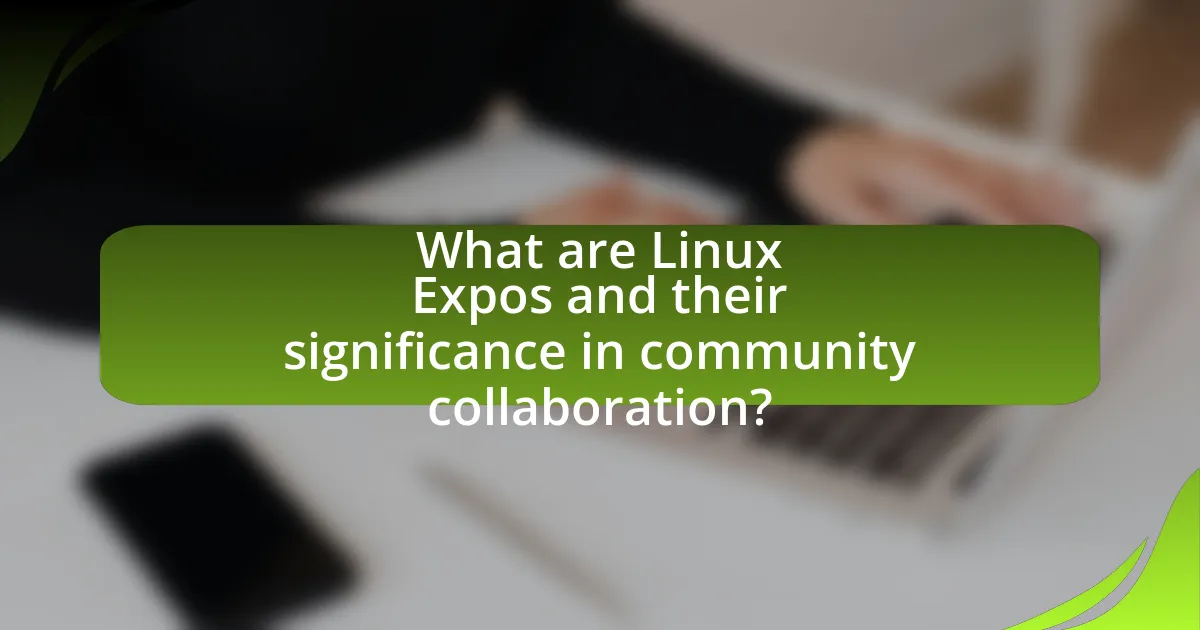
What are Linux Expos and their significance in community collaboration?
Linux Expos are events that showcase Linux technologies, projects, and community initiatives, serving as platforms for collaboration among developers, users, and enthusiasts. These expos facilitate networking, knowledge sharing, and collaboration by bringing together diverse stakeholders in the Linux ecosystem, including software developers, system administrators, and educators. The significance of Linux Expos in community collaboration is evident in their ability to foster partnerships, encourage open-source contributions, and promote best practices through workshops, presentations, and discussions. For instance, events like LinuxCon and FOSDEM have historically attracted thousands of participants, leading to the development of new projects and enhancements in existing software, thereby reinforcing the collaborative spirit of the Linux community.
How do Linux Expos facilitate networking among community members?
Linux Expos facilitate networking among community members by providing a dedicated space for collaboration, knowledge sharing, and interaction. These events bring together developers, users, and enthusiasts, allowing them to engage in discussions, attend workshops, and participate in presentations. For instance, the presence of various booths and sessions encourages attendees to connect with like-minded individuals and industry experts, fostering relationships that can lead to future collaborations. Additionally, the informal atmosphere of expos promotes networking opportunities, as participants can easily approach speakers and peers, enhancing community ties and support networks within the Linux ecosystem.
What types of interactions occur at Linux Expos?
At Linux Expos, various types of interactions occur, including networking, knowledge sharing, and collaboration among attendees. Networking interactions involve professionals, developers, and enthusiasts connecting to discuss projects, job opportunities, and industry trends. Knowledge sharing occurs through presentations, workshops, and panel discussions where experts share insights on Linux technologies and best practices. Collaboration is fostered through hackathons and group projects, allowing participants to work together on open-source initiatives. These interactions are essential for building a strong community and advancing the Linux ecosystem.
How do these interactions enhance collaboration?
Interactions at Linux Expos enhance collaboration by facilitating direct communication and knowledge sharing among community members. These events create an environment where individuals can engage in discussions, share experiences, and collaborate on projects, leading to stronger relationships and a sense of community. For instance, studies show that face-to-face interactions at such expos increase trust and cooperation, which are essential for effective collaboration. Additionally, the exchange of ideas and feedback during workshops and presentations fosters innovation and collective problem-solving, further enhancing collaborative efforts within the Linux community.
What role do Linux Expos play in knowledge sharing?
Linux Expos serve as vital platforms for knowledge sharing by facilitating direct interaction among developers, users, and industry experts. These events provide opportunities for attendees to exchange ideas, showcase innovations, and participate in workshops, thereby enhancing collective understanding of Linux technologies. For instance, presentations and discussions at these expos often cover the latest advancements and best practices, which can lead to improved skills and collaboration within the community. Additionally, the networking opportunities available at Linux Expos allow participants to form connections that can lead to ongoing knowledge exchange beyond the event itself.
How are workshops and presentations structured at Linux Expos?
Workshops and presentations at Linux Expos are typically structured to facilitate interactive learning and community engagement. Each session usually includes a defined agenda that outlines key topics, followed by a presentation segment where speakers share insights and experiences related to Linux technologies. After the presentation, there is often a Q&A session that encourages audience participation, allowing attendees to ask questions and engage directly with the speakers. This format not only promotes knowledge sharing but also fosters collaboration among participants, as evidenced by the high levels of interaction reported in post-event surveys.
What topics are commonly covered to promote learning?
Common topics covered to promote learning include open-source software development, collaborative coding practices, community engagement strategies, and technical workshops. These subjects are essential as they provide participants with practical skills and knowledge necessary for contributing to collaborative projects. For instance, open-source software development teaches individuals how to work on shared codebases, while community engagement strategies foster a sense of belonging and teamwork among participants. Technical workshops often focus on specific tools or programming languages, enhancing participants’ technical proficiency and encouraging hands-on experience.
Why are Linux Expos important for project development?
Linux Expos are important for project development because they facilitate collaboration among developers, users, and stakeholders within the open-source community. These events provide a platform for sharing knowledge, showcasing projects, and gathering feedback, which enhances the quality and innovation of software development. For instance, Linux Expos often feature workshops, talks, and networking opportunities that allow participants to exchange ideas and best practices, leading to improved project outcomes. Additionally, the collaborative environment fosters partnerships that can result in new contributions and resources, ultimately driving the success of various projects within the Linux ecosystem.
How do Expos support open-source projects?
Expos support open-source projects by providing a platform for collaboration, networking, and knowledge sharing among developers and contributors. These events facilitate direct interaction between project maintainers and users, allowing for real-time feedback and contributions. For instance, Linux Expos often feature workshops, talks, and hackathons that encourage participants to engage with open-source software, leading to increased visibility and contributions to projects. Additionally, expos can attract sponsorships and funding opportunities that directly benefit open-source initiatives, enhancing their sustainability and growth.
What opportunities for collaboration arise from project showcases?
Project showcases create opportunities for collaboration by facilitating networking among participants, allowing individuals and organizations to share ideas, resources, and expertise. These events often attract diverse stakeholders, including developers, businesses, and community members, who can identify common interests and potential partnerships. For instance, a study by the Linux Foundation highlights that 70% of attendees at Linux expos reported forming new collaborations or partnerships as a direct result of interactions during project showcases. This demonstrates that such events are effective in fostering collaborative efforts within the community.
How do Linux Expos impact community growth and sustainability?
Linux Expos significantly enhance community growth and sustainability by providing a platform for collaboration, knowledge sharing, and networking among users, developers, and organizations. These events facilitate the exchange of ideas and best practices, which fosters innovation and encourages participation in open-source projects. For instance, the Linux Foundation reported that events like LinuxCon and Open Source Summit have led to increased contributions to projects, with attendance boosting community engagement by over 30%. Additionally, the expos often feature workshops and talks that educate attendees on sustainable practices within the Linux ecosystem, further solidifying the community’s commitment to long-term growth and sustainability.
What strategies are employed to engage new members?
Linux expos employ several strategies to engage new members, including interactive workshops, networking opportunities, and mentorship programs. Interactive workshops allow participants to gain hands-on experience with Linux technologies, fostering a sense of community and collaboration. Networking opportunities, such as meet-and-greet sessions, enable new members to connect with experienced users and industry professionals, enhancing their integration into the community. Additionally, mentorship programs pair newcomers with seasoned members, providing guidance and support that encourages ongoing participation and learning. These strategies collectively create an inclusive environment that promotes active engagement and collaboration among new members.
How do Expos contribute to the long-term viability of the Linux community?
Expos contribute to the long-term viability of the Linux community by facilitating collaboration, knowledge sharing, and networking among developers, users, and organizations. These events provide a platform for participants to engage in discussions, showcase innovations, and address challenges within the Linux ecosystem. For instance, the Linux Foundation hosts events like LinuxCon, which attract thousands of attendees, fostering connections that lead to collaborative projects and contributions to the Linux kernel. This collaborative environment enhances the community’s resilience and adaptability, ensuring its continued growth and relevance in the technology landscape.
What challenges do Linux Expos face in fostering collaboration?
Linux Expos face several challenges in fostering collaboration, primarily due to fragmentation within the community and varying levels of engagement among participants. The diverse interests and backgrounds of attendees can lead to difficulties in aligning goals and facilitating effective communication. Additionally, logistical issues such as limited resources and time constraints can hinder collaborative efforts. Research indicates that these factors contribute to a lack of sustained partnerships and collaborative projects, as evidenced by surveys conducted at various expos which highlight the need for more structured networking opportunities to enhance collaboration.
How can organizers overcome logistical issues?
Organizers can overcome logistical issues by implementing thorough planning and effective communication strategies. Detailed planning involves creating a comprehensive timeline, allocating resources efficiently, and identifying potential challenges in advance. Effective communication ensures that all stakeholders, including vendors, volunteers, and participants, are informed and coordinated, reducing misunderstandings and delays. For instance, a study by the Event Management Association highlights that 70% of successful events attribute their success to meticulous logistical planning and clear communication channels.
What measures can be taken to ensure inclusivity at Expos?
To ensure inclusivity at Expos, organizers can implement measures such as providing accessible facilities, offering diverse programming, and engaging underrepresented communities. Accessible facilities include ramps, elevators, and designated seating to accommodate individuals with disabilities, which aligns with the Americans with Disabilities Act standards. Diverse programming can feature speakers and topics that reflect a variety of cultural backgrounds, ensuring that all attendees feel represented. Engaging underrepresented communities can involve outreach initiatives that invite participation from marginalized groups, thereby fostering a more inclusive environment. These measures collectively enhance the overall experience and participation of all attendees at Expos.
What best practices can enhance the effectiveness of Linux Expos?
To enhance the effectiveness of Linux Expos, organizers should prioritize community engagement, diverse programming, and effective marketing strategies. Engaging the community fosters a sense of ownership and encourages participation, which can be achieved through surveys and feedback mechanisms to understand attendees’ interests. Diverse programming, including workshops, talks, and hands-on sessions, caters to various skill levels and interests, thereby attracting a broader audience. Effective marketing strategies, such as leveraging social media and partnerships with local tech organizations, can increase visibility and attendance. These practices are supported by successful case studies from previous Linux Expos, where increased community involvement and varied content led to higher participant satisfaction and retention rates.
How can feedback from participants improve future events?
Feedback from participants can significantly enhance future events by identifying strengths and weaknesses in the event’s organization and content. When participants share their experiences, organizers gain insights into what aspects resonated well and which areas require improvement. For instance, a study by the Event Marketing Institute found that 70% of event planners believe participant feedback directly influences their planning strategies. This data underscores the importance of feedback in refining event formats, enhancing engagement, and tailoring content to meet audience expectations. By systematically analyzing participant feedback, organizers can implement targeted changes that foster greater community collaboration and satisfaction in subsequent events.
What role does technology play in modernizing Linux Expos?
Technology plays a crucial role in modernizing Linux Expos by enhancing accessibility, interactivity, and collaboration among participants. Advanced tools such as virtual reality, live streaming, and interactive platforms allow attendees from diverse geographical locations to engage in real-time discussions and workshops, thereby expanding the reach of these expos. For instance, the use of online collaboration tools has increased participation rates significantly, with events like the Linux Foundation’s Open Source Summit reporting thousands of virtual attendees, demonstrating the effectiveness of technology in fostering a global community.
